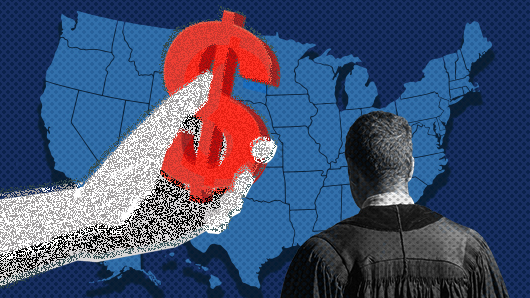In states around the country, judicial independence has been under attack. Last year, at least 25 states considered legislation that would have politicized courts or weakened the judiciary.
The latest example comes in Pennsylvania, where state lawmakers are considering legislation that would change the way appellate judges join or stay on the bench.
Currently, appellate judges in the state are elected statewide in partisan elections. The bill, H.B. 196, would have voters elect supreme court justices to 10-year terms by district rather than statewide. (The bill also covers two lower level appellate courts.) This might seem like an innocuous change, but it in fact makes the process extremely vulnerable to partisan abuse. It was first introduced by a Republican in 2017 after Democrats gained a 5–2 majority on the state’s supreme court.
District-based elections for state supreme court justices are unusual, used by only four states. Under some circumstances, this way of selecting judges can bring advantages. For example, civil rights groups in Alabama and Arkansas have filed lawsuits calling for them, arguing that statewide races make it hard for Black voters to elect their preferred judicial candidates.
But judicial districts can also open the door to judicial gerrymandering and other forms of political gamesmanship. In Pennsylvania, the timing of H.B. 196 — and the amount of discretion it leaves to the legislature in implementation — suggest it’s a thinly veiled attempt by the Republican-controlled legislature to eliminate the Democratic majority on the state supreme court.
Currently, supreme court justices are initially chosen in statewide election and, after serving for 10 years, stand unopposed in up or down retention elections. Under H.B. 196, current supreme court justices would be required to run for reelection in one of the new judicial districts created by the legislature. The bill imposes no restrictions on the ability of the legislature to draw or redraw judicial districts, and it gives the legislature a say in the timing of the state’s transition to district-based elections. That means judicial districts would be vulnerable to partisan manipulation, and that a legislative majority could structure the state’s transition to district-based elections to do maximum harm to justices they disfavor.
Incredibly, the new rules under the bill could make it impossible for a justice to run for reelection when his or her term is up. All the legislature would have to do is draw a new judicial district that the justice does not live in. As the Pennsylvania Budget and Policy Center pointed out, a Democratic justice from Philadelphia is up for retention in 2025, and under H.B. 196, the legislature could force him to run for reelection in a new judicial district hundreds of miles away.
The bill passed the Republican-controlled House in December, and the Republican-controlled Senate, which passed a similar proposal in 2018, is expected to follow suit this session. In order for it to take effect, it would have to be approved by the legislature in two consecutive sessions and then by a referendum.
H.B. 196 isn’t the only threat to the Pennsylvania Supreme Court. Two years ago, the same Republican-controlled legislature attempted to remove four sitting justices — all Democrats — after the court struck down the state’s congressional map as a partisan gerrymander.
State supreme court elections across the country are also attracting unprecedented amounts of spending by special interest groups seeking to influence the outcome of judicial elections — and as a consequence, future court decisions. These groups spent $40 million dollars in supreme elections across 21 states during the 2017–18 cycle.
During the 2015–16 election cycle, Pennsylvania set a national record for aggregate spending in a state supreme court election. The election also saw independent spending by groups representing special interests regularly involved in cases before the court as well as extensive spending by dark-money groups.
Pennsylvania’s method of choosing judges is in clear need of reform. But any changes to how judges are selected must be designed to protect judicial independence and avoid political and special interest pressure on the state’s judiciary. Adopting a lengthy single “one and done” term for supreme court justices and a publicly accountable appointment process would help accomplish those goals. A bill previously under consideration would have replaced the state’s partisan judicial elections with a merit-based selection system, which would also be a step in the right direction.
Judges aren’t politicians, even when they’re elected by voters. And their role in our democracy is to serve as an independent check on the political branches. Legislative attempts to manipulate courts undermine that vital function.



